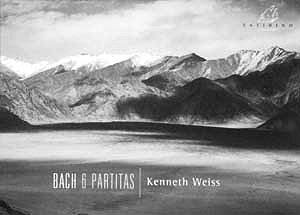Bach's keyboard partitas were his first published works,
his opus 1. These six suites were actually the last suites Bach wrote
for keyboard, and owe a great deal to French influence. They are relatively
popular works, and are recorded by most harpsichordists; in a way, they
are the essential harpsichord works that all soloists must record.
Kenneth Weiss is an American harpsichordist living
in France, where he has worked with William Christie's Les Arts Florissants,
among others. He also pursues a solo career. This is his first solo
recording.
The first thing I noticed when listening to this recording
is that the harpsichord has a big sound. It is an instrument by Anthony
Sidey, and is after a German harpsichord from the Gottfried Silbermann
workshop. This instrument has a rich sound at the lower end and a bright
sound at the treble end, making it sound almost like two different instruments
playing together. The difference is especially noticeable in the majestic
Allemande of the 4th partita, where the walking bass line provides a
tonal contrast with the more discursive right-hand melody.
Weiss seems to be a bit unsure of himself in this recording.
His playing can range from energetic and close to the text, as in the
overture to the 4th partita, a rousing French overture that is one of
the few such movements in Bach's oeuvre, to a more ornamented style
in some of the slower movements, the allemandes and sarabandes. While
the instrument sounds like two instruments, the performer at times sounds
like two performers. He seems almost uncomfortable in some of the slow
movements, as if they are too slow for his taste. To again mention the
Allemande of the 4th sonata, which, for me, is the litmus test of any
harpsichordist, he does not play the repeats, but plays the movement
relatively slowly. Yet, at times, he seems to almost miss a beat, every
now and then, as if he cannot follow the slow tempo very well. His playing
is similar in the opening section of the Sinfonia of Partita no. 2.
This movement begins with a series of chords and double notes played
in a very complex rhythm. Weiss plays it exactly as the score shows,
strictly, inflexibly, and it just sounds too rigid in his version.
He seems uncomfortable in the more complex rhythms
of movements like the Praeludium to the 1st partita; he seems to want
to play in a dotted rhythm, yet it is not clear whether this is actually
the case. His phrasing seems confused, with slight hesitations every
now and then that draw too much attention to themselves. The same is
the case in the Menuet of this partita, where the rhythm seems uncertain,
and one is not sure that it is truly a minuet.
Weiss seems right at home in the faster movements.
The rousing Preambulum to partita no. 5 is a masterful display of virtuoso
playing, and Weiss is brilliant. Movements such as the Gigue in the
1st partita are also brilliant; Weiss seems right in his element here,
with its rapid arpeggios and runs.
To sum up, this is a mixed bag. Weiss is excellent
in the faster movements and uncomfortable in the slower movements. But
it is not enough to only play parts of the partitas well; Bach wrote
a variety of movements to display the full range of dance movements
common in the keyboard suite, and one needs to play them all well, or
the performance sounds unbalanced, which is the case here. Kenneth Weiss
seems to be a promising performer, but he just does not hit the mark
in this recording.
Kirk McElhearn
